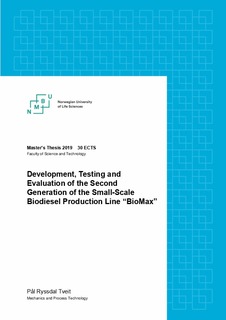Development, testing and evaluation of the second generation of the small-scale biodiesel production line "BioMax"
Master thesis

View/
Date
2019Metadata
Show full item recordCollections
- Master's theses (RealTek) [1722]
Abstract
Finding suitable and economically viable fuel alternatives, that might help mitigate the effect of global warming, is a field of continuous research. Biodiesel is a fuel derived from lipids from biomass that is renewable. Although biodiesel has desirable qualities as a fuel, the current methods of producing biodiesel still require improvements. NMBU is a university dedicated to the green shift, and as such, an effort is being made to research biofuels.
The project for the first generation of “BioMax” was started in January of 2016 by a team of students at “Eik ideverksted” at NMBU and received 500 000 NOK in funding from “Spare-bankstiftelsen”, the Faculty of Science and Technology (REALTEK) and “Eik Idéverksted”. Developing a functional biodiesel production line has been the subject of several reports and theses at the Faculty of Science and Technology, and this thesis aims to provide a platform for future testing. During the span of this thesis, the second generation of the production line has been built, tested, improved upon and tested again.
“BioMax” is a small-scale biodiesel production line for utilizing heterogeneous catalyst tech-nology. The production capacity of the production line is between 6 and 13 liters of reaction mixture. The production line is controlled by a PLC and a semi-automated program has been developed for controlling the production process. Process parameters such as temperature, reactor flow, reaction time and mixing speed can be varied to enable further research into biodiesel production with heterogeneous catalysts.
A FAME yield of approximately 27% was obtained with a methanol to oil ratio of 6:1 during the preliminary test of the second generation. After this, the production line was improved upon and tested again. The results from the tests has been presented and the function of the production line has been evaluated along with propositions for future development work. Å finne passende og økonomisk levedyktige drivstoffalternativer som kan bidra til å redusere effekten av global oppvarming, er et kontinuerlig felt for forskning. Biodiesel er et fornybart drivstoff avledet av lipider fra biomasse som er fornybar. Selv om biodiesel har gode egen-skaper som drivstoff har de nåværende metodene for å produsere biodiesel fortsatt behov for forbedringer. NMBU er et universitet dedikert til det grønne skiftet, og som sådan blir det gjort en innsats for å forske på biodrivstoff.
BioMax-prosjektet ble startet i januar 2016 av et team av studenter på "Eik ideverksted" på NMBU og mottok 500 000 kroner i finansiering fra Sparebankstiftelsen, fakultetet for realfag og teknologi (REALTEK) og Eik Idéverksted. Utvikling av et funksjonelt produksjonsanlegg for biodiesel har vært temaet for flere rapporter og avhandlinger på fakultetet for realfag og teknologi, og denne oppgaven vil bidra med en plattform for fremtidig testing. I løpet av denne oppgaven har anlegget blitt bygget, testet, forbedret og testet igjen.
"BioMax", i sin nåværende tilstand, er et lite biodieselproduksjonsanlegg for bruk av heterogen katalysatorteknologi. Produksjonsanlegget har en kapasitet på rundt ti liter biodiesel. Anlegget kontrolleres av en PLS og et delvis automatisert styringsprogram har blitt utviklet for å kontrollere produksjonsprosessen. Prosessparametere som temperatur, reaktorstrøm, reaksjons-tid og blandingshastighet kan varieres for å tilrettelegge for videre forskning innen biodiesel-produksjon med heterogene katalysatorer.
Et biodieselutbytte på omtrent 27% ble oppnådd med et metanol- til oljeforhold på 6:1 under den første testen. Etter dette, ble produksjonsanlegget forbedret og anlegget ble testet igjen. Resultater fra testing av anlegget har blitt presentert og anleggets funksjon har blitt evaluert sammen med forslag til fremtidig utviklingsarbeid.
